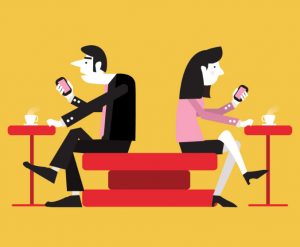BY: ATLAS
“How do you live?”
I got used to hearing that question. It typically followed immediately after the asker discovered one of two things: that I didn’t have a cell phone or that I didn’t have Facebook. For a second-year journalism student, it was an unusual choice. Professionally, I couldn’t give sources a reliable number at which to reach me, I couldn’t check my email around the clock, and I didn’t have access to the life-saving Voice Memos app. Socially, I was excluded from most Facebook-organized outings—let alone last-minute plans—I was a nuisance to get a hold of, and my equivalent of giving a girl my number was giving her my email (better that than risk my mom answering the home phone if she called). And for a while, my friends called me Ludz—yes, as in Luddite.
That changed. I got a hand-me-down BlackBerry from my brother in early 2012 because my school said I would need a smartphone for a digital journalism course. The following year, I had a stint with Facebook while studying abroad and working at my school newspaper before deactivating it as a New Year’s resolution. While my Facebooklessness has stuck—and I’m sure I don’t need to convince anyone why I wouldn’t want Facebook—these days I check my phone as soon as I wake up. It comes with me to the dinner table, on lunch breaks, into the washroom. I open my email by muscle memory, and I pull out my phone instinctively when I am forced to wait or in an awkward situation. In other words, I am a perfectly normal Millennial.

We consistently entertain the illusion that we will be less stressed and more productive if we are always accessible and forever checking our email. Research says the opposite. A Harvard professor named Leslie Perlow found that, when a team of consultants in Boston collectively agreed to adhere to scheduled time off (i.e. no emails outside of work hours), they experienced significantly lower stress levels and worked less, while job anticipation and satisfaction improved and productivity stayed the same. Similar examples elsewhere prove that placing restrictions on emails—no emailing during certain hours, no mass ccing, or no emails at all—cuts down on useless communication and benefits everyone involved. If you really need to get in touch with someone, pick up the phone or, better yet, walk over to their desk.
These sorts of experiments—and one hopes the success of early trials will inspire more to jump on the bandwagon—require communal adoption. One unplugged employee in an office of email-addicted tech-heads will not be less stressed, more satisfied, and more productive. She will just get fired. The benefits arise only when an entire office, an entire company, or, better yet, entire societies decide to use technology on their own terms rather than be used by technology.
I’m a freelance magazine journalist. While I answer to editors and the availability of sources, I suppose that, for the most part, I am my own boss and set my own hours. I try, and frequently fail, to ignore work outside of reasonable weekday hours. Do I feel overwhelmed? Occasionally. Deeply satisfied? Sometimes. Mostly, I’m just happy that I have enough freedom to watch my inbox fill up and choose if it can wait until tomorrow.
But if I’m on a deadline and I need to talk to you, you better pick up the damn phone.



